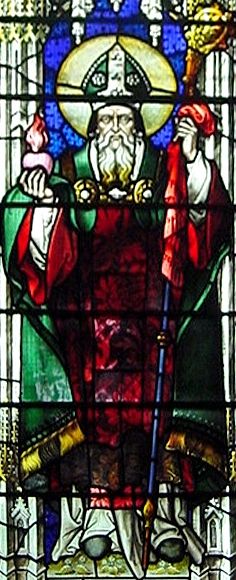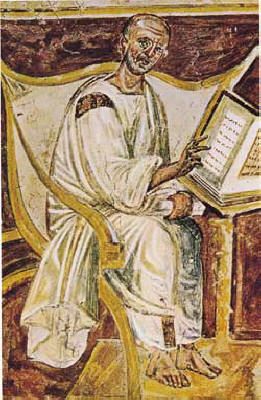We continue our reflections on the writings of Saint Augustine of Hippo (354-430), whose feast day we celebrated yesterday. Bishop, confessor, Doctor of the Church, and one of the Four Great Fathers of the Latin Church, Augustine is one of the most influential thinkers and writers of Catholicism. His legacy in written works numbers at over 100 books, and 5,000,000 words! Within those words, the philosophy and virtues of our faith are revealed, inspiring us to a closer relationship with the Lord.
Today, we read an excerpt from a homily delivered by Saint Augustine, reflecting on the glory of the cross of Christ.
The passion of our Lord and Savior Jesus Christ is the hope of glory and a lesson in patience.
What may not the hearts of believers promise themselves as the gift of God’s grace, when for their sake God’s only Son, co-eternal with the Father, was not content only to be born as man from human stock but even died at the hands of the men he had created?
It is a great thing that we are promised by the Lord, but far greater is what has already been done for us, and which we now commemorate. Where were the sinners, what were they, when Christ died for them? When Christ has already given us the gift of his death, who is to doubt that he will give the saints the gift of his own life? Why does our human frailty hesitate to believe that mankind will one day live with God?
Who is Christ if not the Word of God: in the beginning was the Word, and the Words was with God, and the Word was God? This Word of God was made flesh and dwelt among us. He had no power of himself to die for us: he had to take from us our mortal flesh. This was the way in which, though immortal, he was able to die; the way in which he chose to give life to mortal men: he would first share with us, and then enable us to share with him. Of ourselves we had no power to live, nor did he of himself have the power to die.
In other words, he performed the most wonderful exchange with us. Through us, he died; through him, we shall live.
The death of the Lord our God should not be a cause of shame for us; rather, it should be our greatest hope, our greatest glory. In taking upon himself the death that he found in us, he has most faithfully promised to give us life in him, such as we cannot have of ourselves.
He loved us so much that, sinless himself, he suffered for us sinners the punishment we deserved for our sins. How then can he fail to give us the reward we deserve for our righteousness, for he is the source of righteousness? How can he, whose promises are true, fail to reward the saints when he bore the punishment of sinners, though without sin himself?
Brethren, let us then fearlessly acknowledge, and even openly proclaim, that Christ was crucified for us; let us confess it, not in fear but in joy, not in shame but in glory.
The apostle Paul saw Christ, and extolled his claim to glory. He had many great and inspired things to say about Christ, but he did not say that he boasted in Christ’s wonderful works: in creating the world, since he was God with the Father, or in ruling the world, though he was also a man like us. Rather, he said: Let me not boast except in the cross of our Lord Jesus Christ.
Why pray the Rosary every day for a year?
Each time the Blessed Virgin has appeared-- whether it be to Saint Bernadette Soubirous at Lourdes; to Lucia, Jacinta, and Francisco at Fatima; or to Mariette Beco at Banneux-- she has asserted the importance, saving grace, and power of praying the Holy Rosary on a daily basis. Based upon her words, the Rosary is penance and conversion for sinners, a pathway to peace, an end to war, and a powerful act of faith in Jesus Christ. Pope Paul VI presented the Rosary as a powerful means to reach Christ "not merely with Mary but indeed, insofar as this is possible to us, in the same way as Mary, who is certainly the one who thought about Him more than anyone else has ever done."
To show us how this is done, perhaps no one has been more eloquent than the great Cardinal Newman, who wrote: "The great power of the Rosary consists in the fact that it translates the Creed into Prayer. Of course, the Creed is already in a certain sense a prayer and a great act of homage towards God, but the Rosary brings us to meditate again on the great truth of His life and death, and brings this truth close to our hearts. Even Christians, although they know God, usually fear rather than love Him. The strength of the Rosary lies in the particular manner in which it considers these mysteries, since all our thinking about Christ is intertwined with the thought of His Mother, in the relations between Mother and Son; the Holy Family is presented to us, the home in which God lived His infinite love."
As Mary said at Fatima, "Jesus wants to use you to make Me known and loved. He wishes to establish the devotion to My Immaculate Heart throughout the world. I promise salvation to whoever embraces it; these souls will be dear to God, like flowers put by Me to adorn his throne."

Subscribe to:
Post Comments (Atom)











0 comments:
Post a Comment
Thanks for leaving a comment. If you wish to submit a prayer request, however, please do so above, using the "Contact" tab.